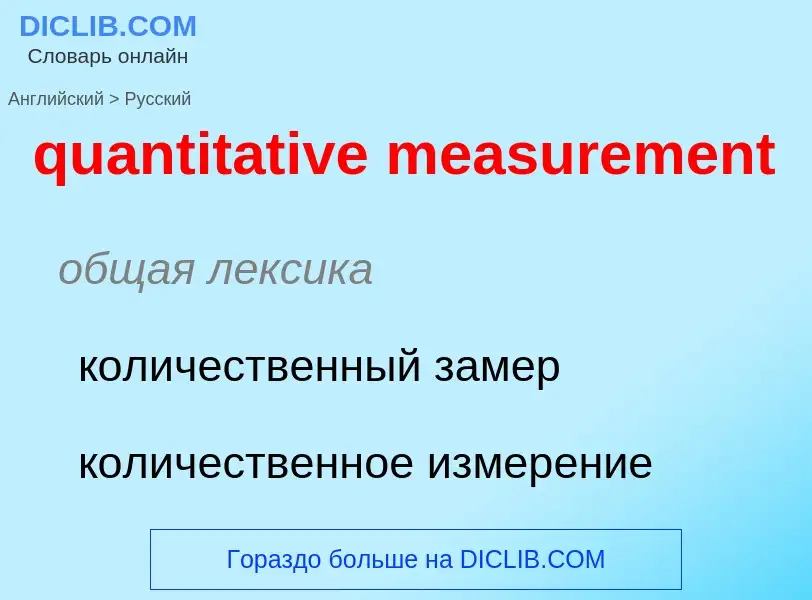quantitative measurement - translation to Αγγλικά
общая лексика
полигенная наследственность
общая лексика
полигенный признак
Βικιπαίδεια
Quantitative research is a research strategy that focuses on quantifying the collection and analysis of data. It is formed from a deductive approach where emphasis is placed on the testing of theory, shaped by empiricist and positivist philosophies.
Associated with the natural, applied, formal, and social sciences this research strategy promotes the objective empirical investigation of observable phenomena to test and understand relationships. This is done through a range of quantifying methods and techniques, reflecting on its broad utilization as a research strategy across differing academic disciplines.
The objective of quantitative research is to develop and employ mathematical models, theories, and hypotheses pertaining to phenomena. The process of measurement is central to quantitative research because it provides the fundamental connection between empirical observation and mathematical expression of quantitative relationships.
Quantitative data is any data that is in numerical form such as statistics, percentages, etc. The researcher analyses the data with the help of statistics and hopes the numbers will yield an unbiased result that can be generalized to some larger population. Qualitative research, on the other hand, inquires deeply into specific experiences, with the intention of describing and exploring meaning through text, narrative, or visual-based data, by developing themes exclusive to that set of participants.
Quantitative research is widely used in psychology, economics, demography, sociology, marketing, community health, health & human development, gender studies, and political science; and less frequently in anthropology and history. Research in mathematical sciences, such as physics, is also "quantitative" by definition, though this use of the term differs in context. In the social sciences, the term relates to empirical methods originating in both philosophical positivism and the history of statistics, in contrast with qualitative research methods.
Qualitative research produces information only on the particular cases studied, and any more general conclusions are only hypotheses. Quantitative methods can be used to verify which of such hypotheses are true. A comprehensive analysis of 1274 articles published in the top two American sociology journals between 1935 and 2005 found that roughly two-thirds of these articles used quantitative method.

![A QTL for [[osteoporosis]] on the human chromosome 20 A QTL for [[osteoporosis]] on the human chromosome 20](https://commons.wikimedia.org/wiki/Special:FilePath/Example of QTL-Scan on a single Chromosom from PLoS Biology.jpg?width=200)
![Example of a genome-wide scan for QTL of [[osteoporosis]] Example of a genome-wide scan for QTL of [[osteoporosis]]](https://commons.wikimedia.org/wiki/Special:FilePath/Example of a Genome-wide QTL-Scan from PLoS Biology.jpg?width=200)